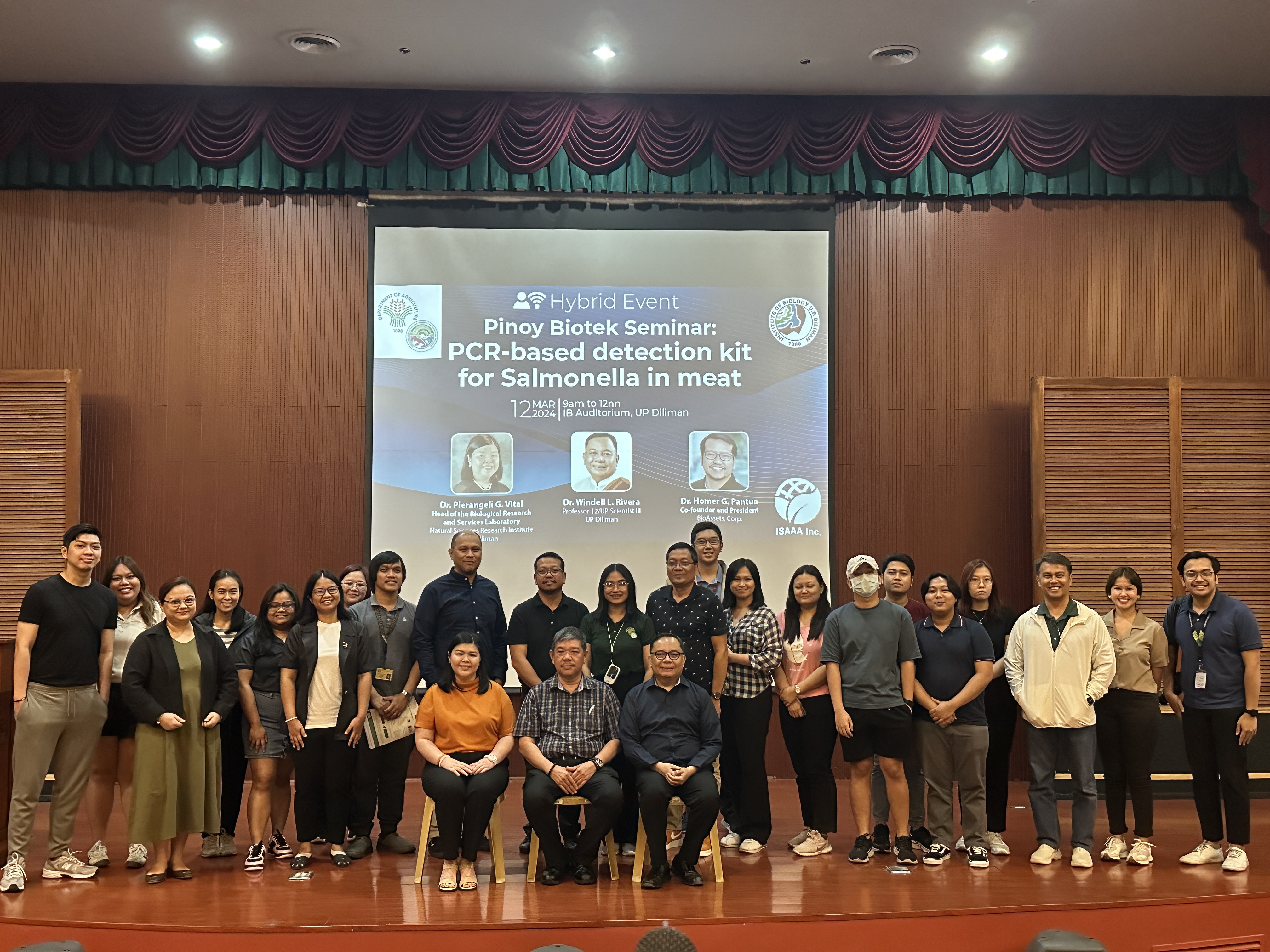
ISAAA and Partners Feature Salmonella Detection Methods Developed in the Philippines
March 13, 2024| |
Researchers, government employees, and students participated in the Pinoy Biotek Seminar: PCR-based detection kit for Salmonella in Meat organized by ISAAA Inc. in partnership with the UP Diliman Institute of Biology. The hybrid event, held on March 12, 2024, was part of ISAAA's Pinoy Biotek project supported by the Philippine Agriculture and Fisheries Biotech Program of the Department of Agriculture (DA Biotech).
The hybrid event served as an avenue to promote the technology to researchers and the food industry to help disseminate the technology for possible adoption. It also helped arouse the interest of the general public in the application of a PCR-based detection kit for Salmonella infection in meat. The event was attended by over 400 participants onsite and via Zoom. The event was also presented on Facebook Live and reached about 3,456 individuals.
Dr. Pierangeli Vital, Head of the Biological Research and Services Laboratory at the Natural Sciences Research Institute, discussed the challenges in food safety and offered solutions to address them. Dr. Vital also highlighted that “Everybody has a role to play in keeping food safe.”
Academician Windell Rivera shared about the different technologies used for Salmonella detection. He highlighted their research on a PCR-based detection kit, which shortened the gold standard of 7 days to three days to complete. The method has been proven to be proficient in beef, chicken, animal feeds, and cotton swabs. The research team intends to add more matrices to be fully adopted in testing laboratories. They also developed a LAMP-based detection technology which is currently being transferred to the laboratories of the National Meat Inspection Service and the Bureau of Animal Industry. In 2023, they completed the DA Biotech-funded project focusing on the utility of next-generation sequencing of Salmonella strains from food chains in Metro Manila. Dr. Rivera also mentioned that they hope that there will be a more widespread utility of the next-generation sequencing technology and better national guidelines and standards for research.
Dr. Homer Pantua discussed the technology development and commercialization pathways that researchers and organizations must go through. Dr. Pantua highlighted that collaboration between various stakeholders is essential, and regulatory requirements and compliance standards are needed to ensure safety and legality.
For more information, watch the event on demand from the ISAAA Webinars.
| |
You might also like:
- Experts Discuss the Role of Biotechnology in Sustainable Agriculture
- ISAAA and BFAR7 Share Benefits of Stock Enhancement of Blue Swimming Crab
- ISAAA and DA-FBC Educated Stakeholders About Mudfish Spawning Technology
Biotech Updates is a weekly newsletter of ISAAA, a not-for-profit organization. It is distributed for free to over 22,000 subscribers worldwide to inform them about the key developments in biosciences, especially in biotechnology. Your support will help us in our mission to feed the world with knowledge. You can help by donating as little as $10.
-
See more articles:
-
Plant
- The Impact of RNAi Technology in Transforming Agriculture
- Technique Genetically Transforms Succulents Without Tissue Culture
- OGTR Receives Application for GM Wheat Field Trial in Australia
- ISAAA Inc. and DA Biotech Release Coffee Table Book on the Filipino Faces of Biotechnology
- ICRISAT Pioneers World's First Pigeonpea Speed Breeding Protocol
-
Animal
- Brazil Releases Genetically Modified Mosquitoes to Combat Dengue Cases
-
Food
- Researchers Identify Molecular Secrets of Muscaris Grapes' Lychee Aroma
- ISAAA and Partners Feature Salmonella Detection Methods Developed in the Philippines
-
Read the latest: - Biotech Updates (February 18, 2026)
- Gene Editing Supplement (January 28, 2026)
- Gene Drive Supplement (February 22, 2023)
-
Subscribe to BU: - Share
- Tweet

